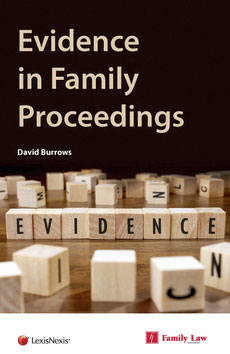
"Common sense dictates to me that you need this book"
Author: David Burrows
Publisher: Jordan Publishing-LexisNexis
ISBN: 9781784732554
Price: £70
This is the most comprehensive work in its area that I have come across, taking in, where so many other works have dared not tread, hearsay and litigation privilege in children cases and disclosure in financial remedy cases. It is essential stuff for practitioners involved in either the preparation of these proceedings or in their advocacy and experts, guardians and lay advisers have much to gain from it.
Advocates will be unable to find any material to assist the judge on swearing in a witness with a speech impediment or who refuses to take the oath or affirm or deciding whether a witness should or should not hear the evidence which is to precede their own testimony, but that’s what judicial training courses are for. Every other angle of evidence receives the most careful attention in digestible text and a kindly introduction to each chapter sets out to tease the topics to be covered if the reader stays with it. The contents pages are equally good but I will shy away from reviewing the index, lest I am branded an anorak.
The authorities are provided for what you thought was a principle and principles abound which you had forgotten ever existed. Yes, it’s actually in the Family Proceedings Rules 2010 that a witness may be permitted to amplify their witness statement or give updating evidence with good reason. You knew that hearsay had gone in children and other family proceedings, but did you know of the procedural requirements for relying at a final hearing on hearsay from a proofed witness not to be called or, being on the other side, getting them to court for cross-examination or attacking their credibility with evidence? The author explains.
When advocating, you may need to pull up the judge with an abundance of great respect if they show signs of veering towards closing down your client in evidence or taking judicial notice of an unproved fact: even worse, using their common sense. We are told how one judge was vindicated for stopping a father seeking to overturn a residence order from continuing in chief with allegations against the mother and giving judgment in her favour when going on would not have been to the advantage of the children. Inferences may be drawn, we are told, from silences in the witness box but a free-wheeling approach to judicial notice is to be avoided. Lord Hoffmann once criticised Lord Justice Ward in a matrimonial finance case for effectively taking judicial notice of prices in the south-east London property market. But on occasion, suggests the author, the judge may be entitled to exercise common sense in place of evidence although reliance on judicial exigence may go wrong.
Common sense dictates to me that you need this book though I don’t need to rest on that. I’m holding it. I have the proof.
Reviewer: Stephen Gold






.tmb-mov69x69.jpg?sfvrsn=16d9dd3d_1)


